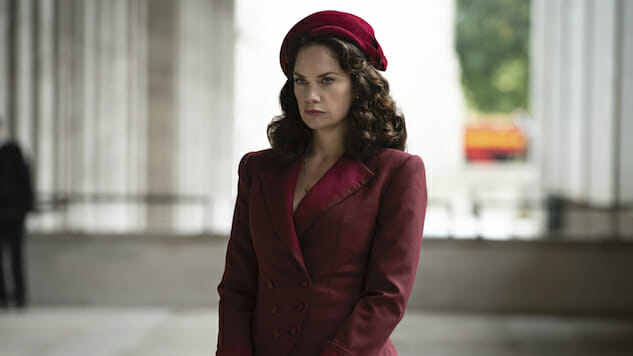How the Villainous Mrs. Coulter Became the Unexpected Beating Heart of His Dark Materials
Photo Courtesy of HBO
HBO’s lavish adaptation of Phillip Pullman’s beloved His Dark Materials saga is full of complicated high fantasy elements, from a magical compound known only as Dust and animal companions who represent physical manifestations of human souls, to compasses that can tell the future and an army of battle bears that sport complicated armor.
Its story wrestles with high-concept questions like faith, sin, belief, love and redemption. It features complicated characters who aren’t entirely good or evil, but somewhere in between. The story includes everything from a creepy theocracy to child trafficking and murder, with a healthy dose of patriarchy along the way. It’s a big, bold, messy tale—which is why it’s so disappointing that this take on the novels so often feels the farthest thing from exciting.
To be fair, this His Dark Materials isn’t bad, by any stretch of the imagination. (If you want to see what bad looks like, try the 2007 feature film version, which erased the first novel’s controversial ending. Yikes!) The HBO version is a fairly meticulous adaptation of Pullman’s story, from its general contempt for organized religion to the complicated mystery of the Dust most of its characters spend their lives obsessed with. It’s got incredible CGI and beautiful visuals. But it’s lacking almost entirely in heart. Sure, these characters fulfill all the beats they’re supposed to, but they also spend an awful lot of time explaining what’s happening in the scenes we’re watching. And, worse, the series almost entirely ignores their interior lives.
All save one.
In theory, Marisa Coulter should be the villain of this television epic. In practice, she’s the beating, messy heart that powers everything else on this show. In fact, she’s the one aspect of the original story that HBO’s adaptation has not only gotten completely right, but that it has fleshed out in ways the original narrative never bothered to do.
True, Mrs. Coulter is still not what you’d call a hero—or a particularly good person. But she is a deeply nuanced figure, a teeming mass of anger, regret, selfishness, pain and love that gives her character layers that many of His Dark Materials’ other primary players do not have. She’s a monster, to be sure, but she’s not entirely an unsympathetic one.
Pullman rarely deviates from Lyra’s point of view in his novels, which is why the Mrs. Coulter we meet there is often underserved by the narrative. That version of the character is embodied by the way a child might see her: Corrupt, frightening, vicious and cruel; the wicked witch from a fairy story. The Mrs. Coulter from HBO’s His Dark Materials is so much more than that—to both the character and the production’s credit.
Part of the television version’s appeal is doubtless tied to Ruth Wilson’s positively ferocious performance, which is so good it often feels as though she’s acting on an entirely different program than everyone else. Bizarrely, given her character, she’s often given much better material than the rest of her castmates, and allowed to wrestle with complicated themes within her performance. And unlike most of the other major characters in the series, Mrs. Coulter isn’t required to strictly stay within a traditional hero or villain lane. Yes, she’s busy kidnapping children and experimenting on them, but she genuinely loves her daughter, and is one of the only characters who explicitly chooses Lyra when given the opportunity to do so.
-

-

-

-

-

-

-

-

-

-

-

-

-

-

-

-

-

-

-

-

-

-

-

-

-

-

-

-

-

-

-

-

-

-

-

-

-

-

-

-








































